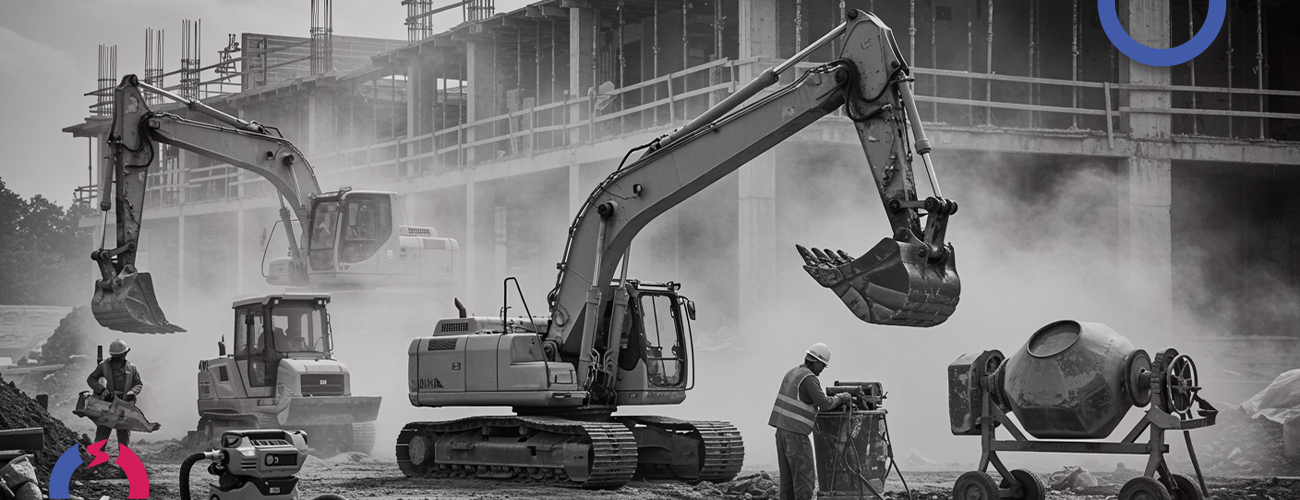Construction is a multifaceted industry, with many different tasks requiring specialized equipment. Whether you are constructing a new building, remodeling a space, or working on a large-scale infrastructure project, the right construction equipment can make all the difference. From excavators and bulldozers to cranes and concrete mixers, each piece of equipment plays a vital role in ensuring the project runs smoothly and efficiently.
What is Construction Equipment?
Construction equipment refers to the various machines, tools, and vehicles used for construction work. These machines help carry out tasks such as digging, lifting, transporting materials, and even finishing work like compacting and smoothing surfaces. The equipment used in construction depends on the scale of the project, the type of work required, and the specific needs of the contractor.
Types of Construction Equipment:
-
Excavators: Excavators are large machines used primarily for digging and earth-moving tasks. They have a bucket at the front that can scoop, dig, and transport dirt, rocks, and debris. Excavators are essential for foundation work, trenching, and demolition projects.
-
Bulldozers: A bulldozer is a heavy-duty piece of equipment used to push large quantities of soil, sand, rubble, or other material during construction projects. These machines come equipped with a large metal blade that can move material efficiently.
-
Cranes: Cranes are used for lifting and transporting heavy materials, such as steel beams, concrete blocks, or other large loads. They are essential for high-rise building construction and infrastructure projects like bridges and towers.
-
Concrete Mixers: Concrete mixers are used to mix cement, sand, gravel, and water to form concrete. These machines are essential for building roads, sidewalks, and foundations, ensuring that the mix is consistent and ready for pouring.
-
Forklifts: Forklifts are used for lifting and transporting heavy materials over short distances. They are commonly used on construction sites to move supplies and equipment from one area to another.
-
Compactors: These machines are used for compacting soil, gravel, and asphalt to ensure the stability of foundations, roads, and other surfaces. Compactors are crucial in preparing the ground for further construction work.
-
Loaders: Loaders are versatile machines equipped with a bucket at the front, making them ideal for loading materials such as dirt, gravel, and debris into trucks or onto other machines.
-
Backhoe Loaders: Backhoe loaders are multifunctional machines that combine a loader and an excavator in one. They are typically used for digging, trenching, lifting, and material handling.
-
Dump Trucks: Dump trucks are essential for transporting loose materials like dirt, sand, gravel, and debris to and from construction sites. These trucks have a hydraulic system that allows the back of the truck to lift and dump its load.
-
Skid Steer Loaders: Skid steer loaders are small, versatile machines used for digging, lifting, and transporting materials. Their compact size makes them ideal for working in tight spaces where larger equipment can’t operate.
Advantages of Construction Equipment:
-
Efficiency: Construction equipment is designed to perform tasks much faster and more efficiently than manual labor. This helps speed up the construction process, saving time and money.
-
Precision: Modern construction equipment, such as excavators and bulldozers, allows for precise control, ensuring the work is done to the exact specifications required by the project.
-
Labor Savings: The use of construction equipment reduces the need for large numbers of workers, helping to lower labor costs and improve overall safety on the job site.
-
Versatility: Many construction machines, such as backhoe loaders and skid steer loaders, are multifunctional, meaning they can be used for a wide range of tasks on different construction projects.
-
Durability: Construction equipment is built to withstand harsh conditions, making it ideal for working in tough environments. Whether in extreme weather or rugged terrain, these machines are designed for durability.
How to Choose the Right Construction Equipment:
-
Project Size: The scale of your project will determine the type and size of the equipment you need. For large projects, such as skyscrapers or highways, you may need heavy-duty machines like cranes and excavators. Smaller residential projects may only require equipment like loaders or forklifts.
-
Terrain and Environment: Consider the terrain of the construction site when selecting equipment. Machines like skid steer loaders are perfect for navigating tight spaces, while bulldozers are better for working on uneven ground.
-
Fuel Efficiency: Fuel consumption is an important factor to consider, especially for long-term projects. Choosing equipment with good fuel efficiency can significantly reduce operational costs.
-
Maintenance and Support: Look for equipment that is easy to maintain and comes with reliable customer service support. Regular maintenance ensures the equipment runs smoothly and reduces downtime on the job site.
-
Safety Features: Always prioritize equipment that includes safety features like automatic shutoff mechanisms, rollover protection, and safety guards to ensure the well-being of the operators and other workers on site.
Maintenance Tips for Construction Equipment:
-
Regular Inspections: Perform regular inspections of your construction equipment to identify any signs of wear and tear. Early detection of problems can prevent costly repairs and downtime.
-
Lubrication: Keep moving parts lubricated to reduce friction and prevent wear. Regular lubrication ensures the equipment runs smoothly and extends its lifespan.
-
Clean Filters and Air Vents: Keeping the air filters and vents clean is crucial for maintaining the equipment’s performance. Dirty filters can reduce engine efficiency and cause overheating.
-
Monitor Fluid Levels: Check oil, coolant, and hydraulic fluid levels regularly to avoid damage to critical components. Low fluid levels can lead to system failures.
-
Proper Storage: When not in use, store equipment in a clean, dry, and sheltered environment. This prevents rusting and damage caused by exposure to the elements.
Conclusion:
Construction equipment plays a pivotal role in the success of any building project, providing the power and precision needed to tackle a wide range of tasks. From excavators to cranes, these machines help improve efficiency, reduce labor costs, and ensure the project is completed on time and within budget. By selecting the right equipment for your specific needs and ensuring proper maintenance, you can guarantee the longevity and effectiveness of your machinery.


